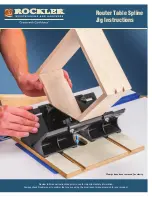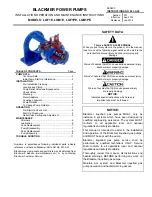
16 Gauge Electric Shear
4
For technical questions call 1-800-665-8685
8343055
V 2.7
PERSONAL SAFETY
CAUTION! Wear protective equipment approved by the Canadian Standards Association (CSA) or American
National Standards Institute (ANSI) when using the electric shear.
1. Dress properly, wear protective equipment. Use breathing, ear, eye, face, foot, hand, and head protection.
Always wear ANSI approved impact safety goggles, which must provide both frontal and side protection.
Protect your hands with suitable gloves. Wear a full face shield if your work creates metal filings or wood
chips. Protect your head from falling objects by wearing a hard hat. Wear an ANSI approved dust mask or
respirator when working around metal, wood and chemical dusts and mists. Wear ANSI approved earplugs.
Protective, electrically non-conductive clothes and non-skid footwear are recommended when working. Wear
steel-toed boots to prevent injury from falling objects.
2. Control the tool, personal movement and the work environment to avoid personal injury or damage to the
tool. Stay alert, watch what you are doing and use your common sense.
3. Keep articles of clothing, jewellery, hair, etc., away from moving parts to avoid entanglement with tool.
4. Do not operate any machine / tool when tired or under the influence of drugs, alcohol or medications.
5. Do not overreach when operating a tool. Proper footing and balance enables better control of a tool in
unexpected situations.
6. Use clamps or other practical ways to support or secure the work piece to a stable platform. Holding the
work piece by hand or against your body is not stable and may lead to loss of control and injury.
SPECIFIC SAFETY PRECAUTIONS
1. Keep hands and fingers away from the cutting area. Any body part coming in contact with moving parts
could cause injury.
2. When operating the electric shear, use proper eye and hearing protection as well as protective heavy
work gloves.
3. To maintain complete control, firmly hold your electric shear with both hands. Do not place hands over air
vents. Proper cooling of the motor is necessary to ensure normal life of the tool.
4. Never point the cutter towards yourself. If it should slip, part of your body could come in contact with
moving parts.
5. Never force the tool. Excessive pressure could bend or break the blades, resulting in damage to the tool,
your work piece or serious personal injury. If your electric shear runs smoothly under no load, but does not
run smoothly under load, then excessive pressure is being used.
6. This tool will not stop moving immediately. Do not lay the tool down or leave it unattended until it has come
to a complete stop. A part that is moving could make the tool jump or grab a surface and pull the tool out of
your control.
7. Hold the tool by the insulated gripping surfaces when performing an operation where the cutting tool may
contact hidden wiring or its own cord. Contact with a “live” wire will make exposed metal parts of the tool
“live” and shock the operator.
8. After changing the blades or making adjustments, make sure the blades and any other adjustment devices
are securely tightened.
9. Always check blades for damage before each use. Damaged blades can break during use and cause
serious injury.
10. Never use dull or damaged blades. Sharp blades must be handled with care. Damaged blades can snap
during use. Dull blades require more force to push the tool, possibly causing the bit to break.
11. Never touch the blades during or immediately after use. After use, the blades will be too hot to be touched by
bare hands.
12. Always keep the extension cord away from moving parts on the tool.





































